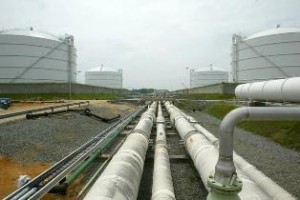 Tags: albania property, Albania Property For Sale, Albania Real Estate, Albanian Property, Albanian Property Market, Buy Property Albania, Real Estate Albania
Tags: albania property, Albania Property For Sale, Albania Real Estate, Albanian Property, Albanian Property Market, Buy Property Albania, Real Estate Albania Britain’s BP, Azerbaijan’s state energy company SOCAR and French multinational Total have taken shares in the Trans Adriatic Pipeline, TAP, a project to pump natural gas from the huge Azerbaijan fields in the Caspian Sea to European markets.
“British Petroleum and SOCAR have each taken a 20 per cent share while Total has acquired 10 per cent,” TAP said in a statement on Tuesday.
“In addition, Fluxys, a major gas transit operator in Europe, has opted to join TAP, taking a 16 per cent stake in the project,” it added.
TAP’s previous shareholders, Axpo of Switzerland, Statoil of Norway and E.ON of Germany, will continue to hold interests in the project.
TAP’s shareholding now comprises BP (20 per cent), SOCAR (20 per cent), Statoil (20 per cent), Fluxys (16 per cent), Total (10 per cent), E.ON (9 per cent) and Axpo (5 per cent).
“Our new shareholders will significantly enhance TAP’s strategic position in becoming an integral link between both their upstream and downstream businesses,” Kjetil Tungland, managing director for TAP, said in a statement.
TAP will transport gas from the Caspian via Greece and Albania across the Adriatic Sea to southern Italy and further into western Europe.
The approximately 870-kilometre-long pipeline will connect with the Trans Anatolian Pipeline, TANAP, near the Turkish-Greek border at Kipoi, cross Greece and Albania and the Adriatic Sea, before coming ashore in southern Italy.
It will open up the new, EU-backed Southern Gas Corridor to Europe and establish a new market outlet for natural gas from the Caspian Sea and beyond, while also helping to reduce Europe’s gas supply dependency on Russia.
Tungland said that the addition of the new shareholders would “further strengthen the integration of the entire Southern Gas Corridor value chain and support TAP’s delivery of the project on time and on budget”.
TAP’s routing will facilitate gas supplies to several south-eastern European countries, including Bulgaria, Albania, Bosnia and Herzegovina, Montenegro, Croatia and others.
Albania is expected to benefit by up to two billion euro in investments only through the construction phase of the pipeline. The project is also expected to enhance the country’s energy security and its strategic position as an energy hub.